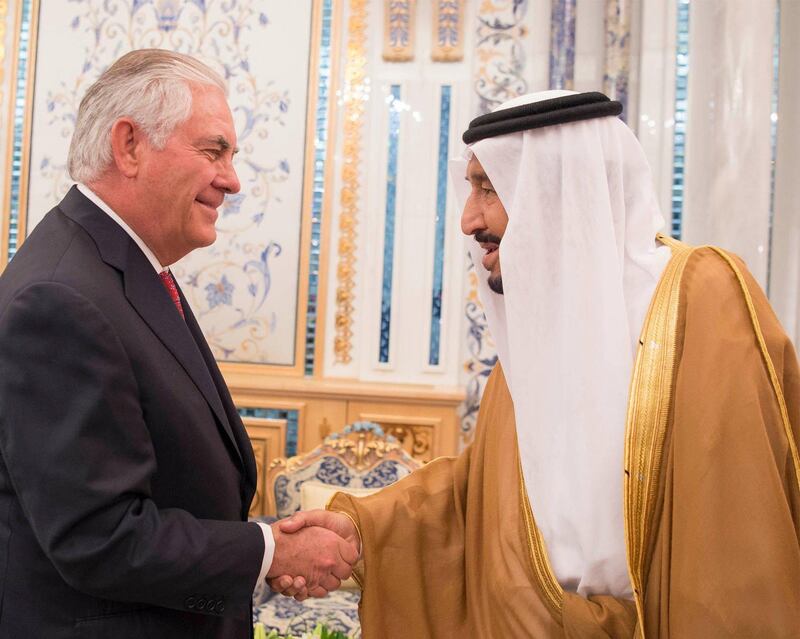US secretary of state Rex Tillerson continued his latest round of shuttle diplomacy on Wednesday, holding extensive meetings with King Salman bin Abdulaziz of Saudi Arabia and Crown Prince Prince Salman bin Abdulaziz in Jeddah, as well as with the foreign ministers of the four countries boycotting Qatar, before returning to Kuwait on Wednesday evening. He will head back to Doha for the second time this week on Thursday.
The Saudi Foreign Ministry said the Jeddah talks covered "all aspects of the Qatar Crisis" but Mr Tillerson made no statement befoore continuing on his quest for a resolution to the Qatar crisis now entering its sixth week. He returned on Wednesday night to Kuwait, where he has been based since Monday.
The secretary of state held an extended meeting with the foreign ministers of the four boycotting nations - Adel Al Jubeir from Saudi Arabia, Dr Anwar Gargash from the UAE, Sheikh Khalid bin Ahmed Al Khalifa from Bahrain and Samek Shoukry from Egypt - and the Kuwaiti minister of state for cabinet affairs Sheikh Mohammed Abdullah Al Mubarak AlSabah.
A spokesman for the Egyptian foreign ministry said the meeting addressed "the various aspects of the crisis with Qatar and all the latest developments.... the foreign minister [Samer Shoukry] explained Egypt’s concerns regarding Qatar’s support of terrorism’.
Mr Tillerson told the Saudi Crown Prince that cooperation between the two countries is key and expressed the importance of building on "the strong partnership between the United States and Saudi Arabia."
Through a translator, the Crown Prince said that he was "full of trust that both countries will be able to overcome all of these challenges," the US Department of State reported on Wednesday.
سمو #ولي_العهد يبحث مع وزير الخارجية الأمريكي #تيلرسون تطورات الأوضاع في المنطقة والجهود المشتركة في مكافحة الإرهاب والتطرف وتمويلهما. pic.twitter.com/YxpIU6jXsE
— بدر العساكر Bader Al Asaker (@Badermasaker) July 12, 2017
Saudi Arabia, UAE, Bahrain and Egypt severed ties with Qatar on June 5 over accusations that Doha is destabilizing the region and refusing to cease its support of terrorism.
The quartet said diplomatic ties would be restored only if Qatar accepted the 13 requirements demanded of Doha and presented to the Qataris on June 22. Qatari officials have since rejected the demands, saying they go against international law and undermine their country's sovereignty.
Mr Tillerson flew to Jeddah following discussions with the Emir of Qatar on Tuesday, where he signed an agreement between Washington and Doha to cut the financing of terrorism.
Mr Tillerson said the agreement signed with Qatar lays out a series of steps that Doha can take to disrupt the financing of terror and intensify counterterrorism commitments across the region.
"The agreement includes milestones to ensure both countries are accountable to their commitments," he said.
Despite what seems like progress, Sheikh Mohammed bin Abdulrahman, Qatar’s foreign minister, said the agreement signed with the US was not the result of pressure from the current crisis. But the four boycotting nations insisted it was only the "repeated pressure and demands over the past years on Qatar to stop supporting terrorism" which had led to the memorandum of understanding between the US and Qatar.
They also said nothing would change unless Doha complied with their demands. While the quartet commended Mr Tillerson's mediation efforts they said they would monitor Qatar as Doha “cannot be trusted.”
Within hours of Mr Tillerson's arrival in Kuwait on Monday night, documents were leaked showing a confidential agreement between the GCC - an agreement which the boycotting nations accuse Qatar of breaching. Known as the Riyadh Agreement and signed in 2013 and 2014, it committed the GCC countries to stop funding extremism and pledged non-interference in each others' domestic affairs.
Both sides accuse the other of breaching that agreement, which had remained secret until this week, and now lies at the root of the current crisis. As Mr Tillerson departed Jeddah, the Qatari ministry of foreign affairs too to Twitter to insist Qatar had complied with the Riyadh Agreement and had documentation to prove it.
Sheikh Sabah Al Ahmed, ruler of Kuwait and chief mediator in the dispute, said on Wednesday that despite the unprecedented bitterness felt all round, he remains hopeful an agreement will be reached in “our Gulf Home.”
Mr Tillerson, who calls himself "a friend to the region", met Qatar's emir Sheikh Tamim in Doha on Tuesday. Standing alongside Qatar's foreign minister, Sheikh Mohammed bin Abdulrahman, the secretary of state said, "The United States has one goal: drive terrorism off the face of the Earth. I am hopeful we can make some progress to begin to bring this to a point of resolution."
Now in its second month, the boycott imposed by the Arab quartet on June 5 shows no signs of letting up.
The US secretary of state believes the Qatar dispute does not serve American interests in the region or the fight against terrorism. Qatar hosts the largest US air force base in the Middle East, with about 11,000 American troops.
Earlier in July, the US state department said the crisis could last months and possibly even intensify, but if Mr Tillerson is successful, it will be considered America's first diplomatic success since he became secretary of state in February.





